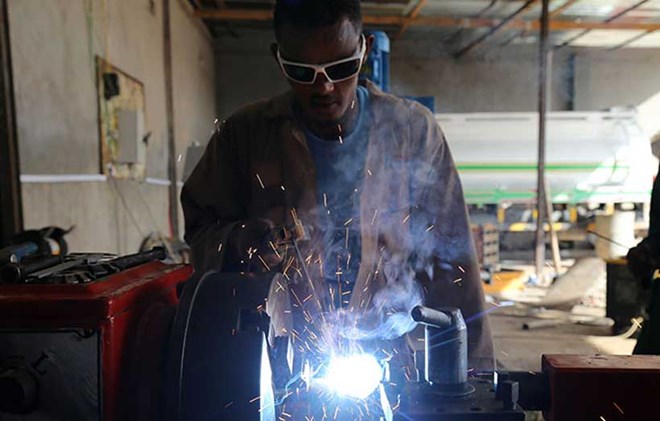
Monday June 4, 2018

Sahal, a dairy farmer, is CEO of Bovine Industry, an urban dairy farm in central Mogadishu. The company cross-breeds Somali cattle with Jersey cattle to produce higher-quality milk.
“Mogadishu is the only capital in the world where you can’t buy fresh milk,” Sahal said. “How can a country that exports the most livestock in the world not have fresh milk?”
Despite the clear need for fresh milk, it has been difficult for Sahal and other small and medium enterprises (SMEs) like his to access capital to grow their businesses. That was before the November launch of the Somali Business Catalytic Fund (SBCF), which aims to spur economic growth in country by supporting SMEs and entrepreneurs.
With support from the SBCF, Sahal was able to fit his backyard business with grazing grass and fences. The demand for fresh milk is soaring, with an average waiting list of three months for a single liter. Soon, Sahal will be able to increase his herd of 15 cows, producing more milk and allowing him to employ more people. He believes that development should be based on grassroots needs, and simple supply/demand analyses.
“Farmers have the knowledge to pasteurize milk, produce yogurt and expand the Somali dairy sector,” he said. “We just need the machinery and capital to make it happen.”
SBCF, the Bank’s flagship job creation initiative in Somalia, targets businesses that focus on innovative processes, products and markets new to the region. It is also intended to stimulate the business and technical services industry to build sector expertise in agriculture, livestock and energy, among others. So far, the SBCF has selected 101SMEs across the Somali peninsula – South Somalia, Puntland and Somaliland — to receive financial and technical support. The selected firms are expected to generate more than 2,000 jobs.
“Poverty reduction in Somalia must be private sector-led. We have relied on traditional aid since the early 1990s, and handouts have not been a sustainable method to reduce poverty,” said Sahal. “I believe that access to capital is crucial for both job creation and dignified poverty reduction.”
Asli Health Care Company, based in Hargeisa, has also benefited from the SBCF. The company’s manager, Nemo Yusuf, founded the company after she and her partners studied imports to Somaliland. Through a market study, she and her partners studies the viability of producing beauty products and creating jobs in the process.
“We observed an excess of imports of personal healthcare and beauty products from China and the Middle East, most of which could be produced domestically,” she said. “Our study confirmed that we could produce and sell shampoo, soaps and detergents competitively,” she said. “A reality that is too familiar with Somalis is that we import most products, when we should be producing them.”
Through the SBCF, Yusef was able to purchase high-speed manufacturing equipment, allowing her to produce shampoo bottles that limit waste from importing more plastic.
Her company is also supported through the SME Facility (SMEF). SMEF provides technical assistance and business development services to assist Somali entrepreneurs to launch, manage, and grow successful businesses. Asli and her partners were trained in budget planning, finance, and human resources training, which is helping their business become more effective.
Armed with this knowledge, Yusuf and her partners have expanded their business. They created a sachet-packet shampoo line as a new product.
“There is a demand for one-time use 10 milliliter sachets, especially among young people and those who cannot afford full bottles,” Yusuf said. “We are in the process of manufacturing our own bottles to drive prices even lower.”
Challenges in Hargeisa are similar to those in Mogadishu, where Yusuf said “accessing capital is probably the main constraint to private sector growth.” There are also challenges such as the availability of skilled labor, supply-chain issues related to infrastructure, affordable energy and economic policies that support private sector competitiveness are also prominent.
Yusuf can see the results in Hargeisa, where the large market could be used to create jobs for young people as well as keep currency in the market and limit inflation.
“Our company is managed entirely by fellow citizens,” she said. “We have employed an additional 17 people to support the expansion of our company, of which most are young people. A third of our employees are women.”